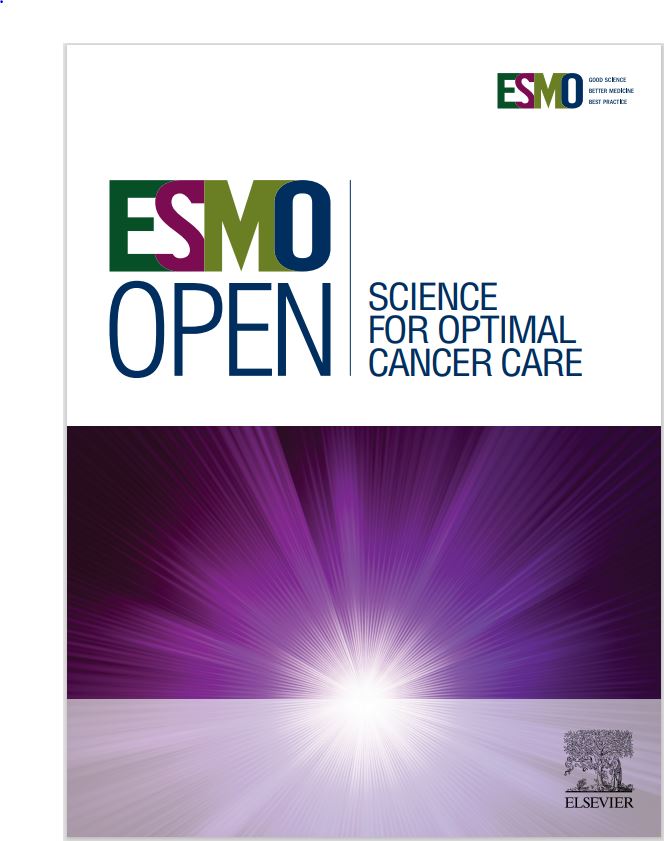Atezolizumab monotherapy for metastatic urothelial carcinoma: final analysis from the phase II IMvigor210 trial
IF 7.1
2区 医学
Q1 ONCOLOGY
引用次数: 0
Abstract
Background
The IMvigor210 trial demonstrated clinical benefit and manageable toxicity with atezolizumab monotherapy [anti-programmed death-ligand 1 (PD-L1)] in patients with metastatic urothelial carcinoma (UC) in primary analyses. Final efficacy and safety results after long-term follow-up are reported.
Patients and methods
This phase II single-arm trial of atezolizumab monotherapy in patients with advanced UC included two cohorts: untreated patients ineligible for cisplatin-based chemotherapy (cohort 1; n = 119) and those previously treated with platinum-based chemotherapy (cohort 2; n = 310). Atezolizumab was administered i.v. (1200 mg every 21 days) until progression or unacceptable toxicity. Primary endpoints were independent review facility-assessed confirmed objective response rate (ORR) per RECIST 1.1 in cohort 1 and independent review facility-assessed ORR per RECIST 1.1 and investigator-assessed modified (m)RECIST in cohort 2. Overall survival (OS), efficacy by PD-L1 status, and safety were also assessed.
Results
At data cut-off (1 June 2023), the median survival follow-up was 96.4 months (range, 0.2-103.4 months) in cohort 1 and 46.2 months [0.2 (censored)-54.9 months] in cohort 2. In cohort 1, the ORR [95% confidence interval (CI)] was 23.5% (16.2% to 32.2%) in all patients and 28.1% (13.8% to 46.8%) in the PD-L1 tumor-infiltrating immune cell (IC)2/3 subgroup. Median OS (95% CI) was 16.3 months (10.4-24.5 months) overall and 12.3 months (6.0-49.8 months) in the PD-L1 IC2/3 subgroup. In cohort 2, the ORR (95% CI) was 16.5% (12.5% to 21.1%) per RECIST 1.1 and 19.7% (95% CI 15.4% to 24.6%) per mRECIST in all patients and 27.0% (18.6% to 36.8%) and 28.0% (19.5% to 37.9%), respectively, in the PD-L1 IC2/3 subgroup. Median OS (95% CI) was 7.9 months (6.7-9.3 months) in all patients and 11.9 months (9.0-22.8 months) in the IC2/3 subgroup. Treatment-related grade 3/4 adverse events occurred in 21.8% (cohort 1) and 18.7% (cohort 2); one treatment-related death occurred in cohort 1.
Conclusions
With long-term follow-up, atezolizumab monotherapy demonstrated clinically meaningful efficacy with durable responses in a subset of patients with metastatic UC; there were no new safety signals.
Atezolizumab单药治疗转移性尿路上皮癌:II期IMvigor210试验的最终分析
背景:在初步分析中,IMvigor210试验证明了atezolizumab单药治疗转移性尿路上皮癌(UC)患者的临床益处和可控的毒性。经长期随访,报告了最终疗效和安全性结果。患者和方法:atezolizumab单药治疗晚期UC患者的II期单组试验包括两个队列:未经治疗的不适合顺铂化疗的患者(队列1;N = 119)和先前接受过铂类化疗的患者(队列2;N = 310)。Atezolizumab静脉注射(1200mg / 21天),直到进展或不可接受的毒性。主要终点是队列1中独立评价机构评估的确认客观缓解率(ORR),每RECIST 1.1;队列2中独立评价机构评估的ORR,每RECIST 1.1和研究者评估的修正(m)RECIST。总生存期(OS)、PD-L1状态的有效性和安全性也进行了评估。结果:截止数据(2023年6月1日),队列1的中位生存期随访为96.4个月(范围0.2-103.4个月),队列2的中位生存期随访为46.2个月(0.2 -54.9个月)。在队列1中,所有患者的ORR[95%置信区间(CI)]为23.5%(16.2%至32.2%),PD-L1肿瘤浸润免疫细胞(IC)2/3亚组的ORR为28.1%(13.8%至46.8%)。中位OS (95% CI)总体为16.3个月(10.4-24.5个月),PD-L1 IC2/3亚组为12.3个月(6.0-49.8个月)。在队列2中,所有患者的ORR (95% CI)分别为16.5%(12.5%至21.1%)/ RECIST 1.1和19.7% (95% CI 15.4%至24.6%)/ mRECIST, PD-L1 IC2/3亚组的ORR分别为27.0%(18.6%至36.8%)和28.0%(19.5%至37.9%)。所有患者的中位OS (95% CI)为7.9个月(6.7-9.3个月),IC2/3亚组为11.9个月(9.0-22.8个月)。治疗相关的3/4级不良事件发生率分别为21.8%(队列1)和18.7%(队列2);队列1中发生1例治疗相关死亡。结论:通过长期随访,atezolizumab单药治疗在转移性UC患者中表现出具有临床意义的疗效和持久的反应;没有新的安全信号。
本文章由计算机程序翻译,如有差异,请以英文原文为准。
求助全文
约1分钟内获得全文
求助全文
来源期刊

ESMO Open
Medicine-Oncology
CiteScore
11.70
自引率
2.70%
发文量
255
审稿时长
10 weeks
期刊介绍:
ESMO Open is the online-only, open access journal of the European Society for Medical Oncology (ESMO). It is a peer-reviewed publication dedicated to sharing high-quality medical research and educational materials from various fields of oncology. The journal specifically focuses on showcasing innovative clinical and translational cancer research.
ESMO Open aims to publish a wide range of research articles covering all aspects of oncology, including experimental studies, translational research, diagnostic advancements, and therapeutic approaches. The content of the journal includes original research articles, insightful reviews, thought-provoking editorials, and correspondence. Moreover, the journal warmly welcomes the submission of phase I trials and meta-analyses. It also showcases reviews from significant ESMO conferences and meetings, as well as publishes important position statements on behalf of ESMO.
Overall, ESMO Open offers a platform for scientists, clinicians, and researchers in the field of oncology to share their valuable insights and contribute to advancing the understanding and treatment of cancer. The journal serves as a source of up-to-date information and fosters collaboration within the oncology community.
 求助内容:
求助内容: 应助结果提醒方式:
应助结果提醒方式:


